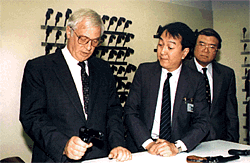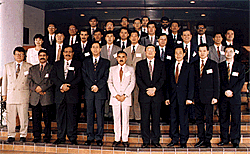Chris Patten visits
PHQ for the last time as Guv

The Governor checks out a confiscated
"Blackstar" at the B&FI Bureau |
IT was a dismal, rainy day in May, but that didn't seem to dampen the
spirits of Governor Chris Patten who greeted CP Eddie Hui Ki-on with a "Hi,
Commissioner, nice to see you," before he was ushered into Arsenal
House for what would be the last formal visit by a British Hong Kong Governor
to Police Headquarters before the handover of sovereignty on 1 July.
The visit was informal yet business-like with Governor Patten scheduled
to be updated by the Planning and Implementation team on security and police
operations in connection with the handover ceremonies, followed by a briefing
at the Criminal Intelligence Bureau, then given a tour of the Ballistics
and Firearms Identification Bureau.
After signing the visitor's book, the entourage made its way up to the sixth
floor of the East Wing of Arsenal House to a room overlooking Victoria Harbour
and the sites of the Farewell and Handover ceremonies - Tamar and the
Hong Kong Convention and Exhibition Centre Extention. "Looks like you
polished the floor here just for my visit," Governor Patten joked as
he met with members of the Planning and Implementation team.
With the site that will be televised to the world in the background, CSP
SD Tang King-shing outlined the security plans for the Farewell and Handover
ceremonies. P & I team members had to field a lot of astute questions
from the Governor who talked about special arrangements for such internationally
protected persons as Margaret Thatcher and US Secretary of State Madelaine
Albright, the handling of demonstrators at the event, and a myriad of other
arrangements.
The long briefing was followed by a demonstration of security equipment
to be deployed during the ceremonies.
The entourage then made its way to the new West Wing of Arsenal House for
a tour of the Criminal Intelligence Bureau, where the Governor listened
keenly as Fung Siu-yuen, ACP Crime, and Chan Wai-ki, CSP CIB, briefed him
on the Bureau's charter.
The CIB is responsible for monitoring triad and organised crime activities,
and conducting intelligence-based operations against triad societies and
syndicates engaged in serious crime. As the activities of organised criminals
become international in scope, the need for close co-operation between law
enforcement agencies grows. CIB maintains liaison with overseas agencies,
many of which have officers stationed in Hong Kong, or in the region. This
results in a regular exchange of information and provides a framework for
effective concerted action.
The Governor was extremely impressed with the Bureau's Criminal Intelligence
Computer System - its sophisticated workings presented by Jeff Herbert,
Superintendent CIB E Division.
At the Ballistics and Firearms Identification Bureau, Mr Patten met with
staff who explained the work of the BFIB, which recently upgraded its facilities
by acquiring some of the most sophisticated equipment available for the
forensic examination of arms and ammunition.
The Governor was given a demonstration of how gunshot residue can determine
whether someone has fired a weapon; examined two spent bullets through the
Bureau's state-of-the-art computerised comparison microscope; saw
the indoor shooting range where test firing of suspects' weapons
is conducted; and had some "hands on" experience with a "Blackstar"
sidearm - one of many mainland weapons seized in crime cases.
The Governor, a great supporter of the Royal Hong Kong Police Force, left
PHQ with as little pomp and ceremony as when he arrived.

"It's business as usual" after
handover say Asian Interpol delegates

Asian Interpol contact officers are told by CP that "the
Force will retain the sole responsibility for internal security and the
policing of Hong Kong including its waters and border with China" |
"The FBI has been working with the Hong Kong Police
for over 30 years. The best way to describe the two Forces in terms of co-operation
is 'two countries, one-system'. We don't expect anything to change after
July. It's business as usual"
THE Hong Kong Police Force will remain a part of Interpol after the change
of sovereignty but will operate as a sub-bureau of China instead of being
a sub-bureau of Britain, Commissioner of Police Eddie Hui Ki-on told the
29 delegates from 17 Asian countries attending the Second Interpol Meeting
of Asian Contact Officers.
CP Hui said that apart from a few very superficial and cosmetic changes
in which the Force would drop the word "Royal" from its name,
there would be no disruption to the Force's work and no change to
the way in which the Hong Kong Police carry it out.
"The rank and organisational structure of the Hong Kong Police will
remain as it is today and the Force will retain the sole responsibility
for internal security and the policing of Hong Kong - including its waters
and border with China. With regard to myself as Commissioner of police,"
Mr Hui continued, "I shall be responsible to the Chief Executive of
Hong Kong and will not be subordinate to the Public Security Ministry in
Beijing."
The Commissioner noted that the Hong Kong Police work closely with other
Interpol members, particularly those who had law enforcement agents attached
to their consular offices in Hong Kong and those in neighbouring cities.
Said Police Commissioner Hui: "To ensure that bureaucracy does not
get in the way of good police work, our Crime Bureaus are free to liaise
directly with their counterparts and contact officers throughout Asia on
behalf of Interpol Hong Kong. Such direct communication works well and has
enabled us to put numerous criminals behind bars in Hong Kong and overseas."
Hong Kong joined the Interpol in 1960 and has been an active and committed
member. Hong Kong Police officers regularly attend conferences organised
by Interpol and the Force has a superintendent based at Interpol Headquarters
in Lyon, France.
The Asian Contact Officer Network was set up in 1995 to provide the structure
for urgent and effective personal contact between Asian National Central
Bureaus (each member state in Interpol is represented by a National Central
Bureau) and sub-bureaus. The contact officers are responsible for rapid
transmission of police information and assistance. There are 48 contact
officers from 30 Asian NCBs and sub-bureaus.
According to this year's chairman of the conference, Mohammad Zahid Mahmood
from Pakistan, from an Asian perspective the meeting was extremely constructive
as participants discussed operational and procedural problems for discharging
their liaison functions and focused on solutions.
"Suggestions for improvement to the present working methods of the
Asian Contact Officers were discussed and adopted," he said. "A
lot was accomplished. This meeting helped us make informal contacts and
understand each other and, in terms of Interpol, will make the organisation
in the respective Asian countries more effective. This will definitely have
a bearing on the control of crime." |




















